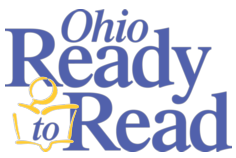These links are for people registered to attend the online version of the Early Literacy 101 workshop. Please read/view all the items on the first list before the first workshop session. Please read/view all the items on the second list before the second workshop session.
EL101 Session 1 (Introduction, Brain Development, Five Practices)
Pre-reading/viewing assignments
- Ohio Ready to Read overview flyer
- Milestone Moments
- Milestones in Early Literacy Development
- Harvard Center for the Developing Child videos:
- Brain Development in Early Childhood and Brain Research
- How Are Brains Built?
- Parentese video (PBS)
- Having a Conversation about the Pictures in a Book
- Not Just Scribbles: How Tots Start Learning Text is Symbolic
- The Many Benefits of Messy Play
- A Letter from Play to Parents
Bring with you to the online workshop session:
- Two (or more) picture books that you like to use in storytime. If you don’t lead storytime, bring two (or more) picture books, board books, and/or early nonfiction that you would recommend to families with young children.
EL101 session 2 (Decoding and Comprehension, Six Skills, Putting It All Together)
Pre-reading/viewing assignments
- Summary of the Six Skills
- Background Information for Storytime
- Music in Early Literacy Storytimes
- From the Six Skills to the Five Practices
- The Five Practices and the Early Literacy Components Support Each Other
- Anatomy of a Storytime Literacy Message from Mel's Desk
- Saroj Ghoting video: What Is an Effective Early Literacy Aside?
- Saroj Ghoting video: All Three Early Literacy Asides
- So You're Parenting a Preschooler
- 40 Developmental Assets for Early Childhood
Bring with you to the online workshop session:
- Two (or more) picture books that you like to use in storytime. If you don’t lead storytime, bring two books that you would recommend to families with young children.
- One storytime outline. If you don't lead storytime, you may borrow a storytime outline from a co-worker or locate one online. If you have questions, contact your workshop facilitator.
- If you can, print and bring a copy each of the Background Information for Storytime and Anatomy of a Storytime Literacy Message handouts. They will be helpful during a group activity.
